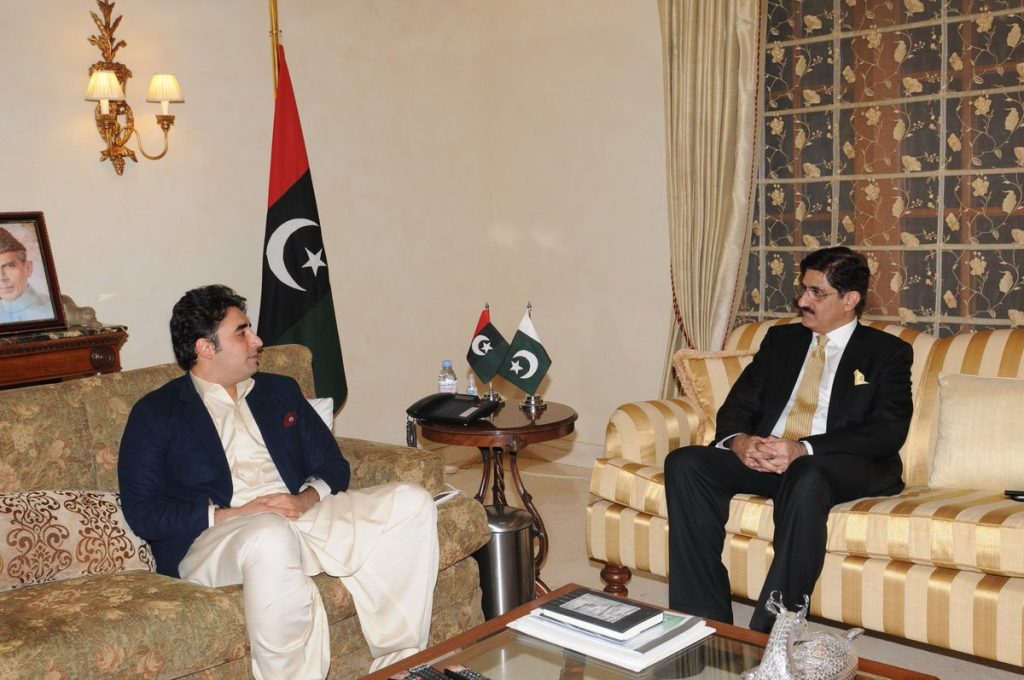Government of Sindh has initiated its strategic efforts towards meeting UN’s global goals for sustainable development. A high-level meeting took place today between Bilawal Bhutto Zardari, Chairman PPP, Murad Ali Shah, Chief Minister Sindh, and Quratulain Marri, Senator, and Ignacio Artaza, Resident Representative, and Shakeel Ahmed, Assistant Resident Representative, UNDP Pakistan, to discuss the role of political leadership inmoving forward to achieve 17 SDGs and Agenda 2030 in Sindh.
In 2016, Government of Sindh, as part of the national initiative on SDGs, adopted the global Agenda 2030 and its 17 Sustainable Development Goals, that inculcate a vision and direction for a better tomorrow, targeting human prosperity, reduction in poverty, healthy eco-systems, a stable climate, and a clean environment. 06 SDGs have been set as priorities up to 2025 by the Chief Minister Sindh: Good Health and Well-being, Quality Education, Clean Water and Sanitation, Affordable and Clean Energy, Zero Hunger, and Decent Work and Economic Growth, while No Poverty, Gender Equality, and Climate Action remain integral cross cutting issues. With UNDP Pakistan’s technical support, a devoted SDGs Support Unit has been set up and is operational in Planning & Development Board to create and facilitate an enabling environment for government of Sindh and pertinent stakeholders, across multiple sectors to achieve Agenda 2030, through policy advocacy, research, knowledge management, devising of innovative approaches, with the aim to mainstream and localize SDGs in the province.
Under Bilawal Bhutto Zardari and CM’s leadership, Sindh has been progressing significantly in its efforts to localize SDGs but there is a lot that needs to be further done. The novel public-private partnership in the form of Sindh Engro Coal Mining Company, that is working towards bringing grassroot level change in the local community of Tharparker, is helping to address multiple SDGs, and is a best practice that can be replicated to other regions that are poverty-stricken such as Umarkot, Sajawal, Thatta and Tando Mohammad Khan.
Sindh’s Multi-Dimensional Poverty Index (MPI), which is 43.1%, higher than the national average, and Human Development Index (HDI) of 0.640, warrant attention of the government towards a greater need to innovate, devise multi-sectoral development plans, and all the while adopt a more holistic approach.
UNDP Pakistan and its SDGs Support Unit in Sindh are actively providing policy advice, and is engaged in developing a SDGs Framework for Sindh that can guide the political leadership of the Government of Sindh in developing the much-needed integrated plans that can help address soaring and complex development challenges that the province is facing, such as health epidemic, unemployment and poverty, out-of-school children, power shortages, etc.
“We plan to have many development initiatives in Sindh and would benefit from the technical expertise of UNDP and SDGs Support Unit to integrate Agenda 2030 and attain 17 SDGs whilst bringing grassroot level change in Sindh and empower our local communities”, said Bilawal Bhutto, Chairman, PPP
“We are committed to Agenda 2030 in Sindh and interested in leading coordinated efforts to attain 17 SDGs with the support of UNDP Pakistan and Sindh SDGs Support Unit. We are enabling the private sector to form successful public-private partnerships to collaborate on our development initiatives, Thar being an example” – Murad Ali Shah, Chief Minister, Sindh
“In leading coordinated efforts for accelerated progress towards localization and attainment of Agenda 2030 and 17 SDGs in Sindh, political commitment is of paramount significance. Political leadership and ownership of Agenda 2030 can be further enhanced, and integrated multi-sectoral development plans and policies can be devised with the technical support from UNDP’s Sindh SDGs Support Unit”, said Ignacio Artaza, Resident Representative, UNDP Pakistan.
https://mediacellppp.wordpress.com/

No comments:
Post a Comment